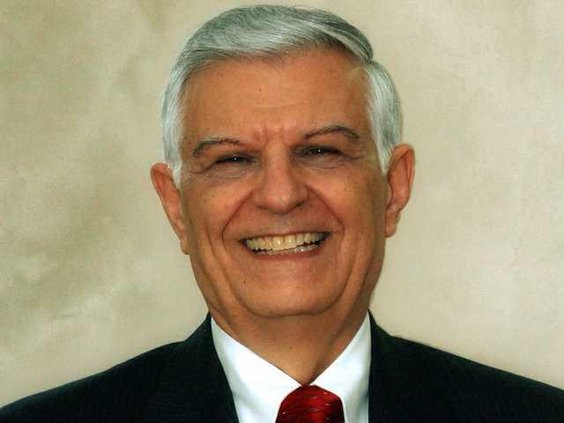0822ErricoAUD
The Rev. Rocco Errico talks about literal translations of the Bible.The All-Inclusive Non-Violent Way of Jesus
What: A workshop presented by the Rev. Rocco Errico
When: 3 p.m. Aug. 30
Where: Unity of Gainesville Church, 3361 Clarks Bridge Road, Gainesville
Cost: $25
More info: 770-534-0949
Noohra Foundation: Learn more about this spiritual educational organization, dedicated to helping people understand the Bible from a Near Eastern Aramaic perspective.
The Lord's Prayer: Listen to the Rev. Rocco Errico read The Lord's Prayer in Aramaic.
What's the difference?
According to the Rev. Rocco Errico, different translations of the Bible can read differently in English. Here are some examples:
Psalm 23:2
- He maketh me to lie down in green pastures; he leadeth me beside the still waters.'
(King James version) - ‘And he makes me to dwell in pastures of strength. He guides me by refreshing waters.'
(Aramaic text translated by Errico)
Psalm 46:10
- ‘Be still and know that I am God!'
(King James version) - ‘Return to me and know that I am God!'
(Aramaic text translated by Errico)
After 30 years of preaching in nondenominational churches, the Rev. Rocco Errico discovered the Aramaic-translated version of the Bible. And, he said, it just seemed to make more sense.
"Aramaic is the language of Jesus," said the dean of biblical studies at Hillside Chapel and Truth Center in Atlanta. "People would always ask me questions about the Bible and about Jesus' teachings thatI couldn't answer ... All the clarification came (with the Aramaic text) and I didn't have to worry about explaining it to people anymore."
Errico will present a workshop on Aug. 30 at Unity Church of Gainesville to introduce others to the Aramaic translation of the Bible.
"What I'm going to be talking about is the nonviolent way of Jesus," he said. "In other words, how are we going to have heaven on earth? It is understanding his teaching from Aramaic, the meaning of the words from the culture and from the psychology of the people at that time."
One of the most common myths Errico said he will debunk is that the New Testament was written in Greek.
"Hebrew was the Old Testament; the controversy is the New Testament," he said. "The controversy is that it was written in Aramaic first and then translated into Greek, or was it written in Greek first and then translated into Aramaic. Only 20 percent of the scholars believe that Aramaic came first and Greek is the translation from Aramaic and a good 75 to 80 percent hold to the Greek.
"The Aramaic text does not agree with the Greek text," he said. "If it is a translation from Greek, why doesn't it agree with it?"
Errico, also a published author, explains that the differences in the Greek and Aramaic translations in the New Testament change the meanings of many scriptures.
"The words that Jesus spoke on the cross ... which are Aramaic words, not Greek. But when they are put into Greek it says ‘My God, my God why have you forsaken me?' But in Aramaic it means, ‘My God, my God, for this you have kept me,' in other words to fulfill this, I am fulfilling a destiny, you see," Errico said.
Another example is the story of Lot and Sodom and Gomorrah.
"Like Lot's wife turned into a pillar of salt and God's going to turn people into pillars of salt, sure," Errico said. "That's an Aramaic way of speaking meaning she suffered a stroke and became paralyzed and died."
It also helps the reader understand the meaning behind the story of Noah and the ark.
"Noah building an ark as big as the Queen Mary - come on now, with only eight people and some of them were women, it doesn't make sense. You have to understand that it is exaggerated," he said. "It was a valley that flooded but because it uses the word earth, the Aramaic earth, not only means the entire earth but also means land, property."
Errico admitted that at first when he began studying the Aramaic text with Aramaic scholar George Lamsa that is was difficult to change a lot of the beliefs he grew up with. But, he said, he was ready for the change.
"I doubted this and I doubted that," he said. "It took time for me to grasp what Jesus was all about. I thought I had a hold of Jesus because I had grown up in a fundamental style church, and I thought I knew the Gospel; I found out I didn't know the Gospel."

